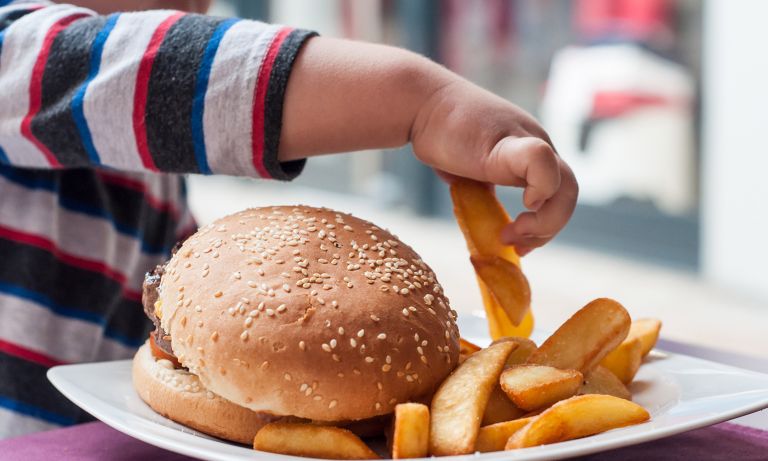The Skinny on Childhood Obesity
Does your child have a weight problem? These tips can help your child reach and maintain a healthier weight.

Childhood obesity: understanding the problem
As a parent, few things are cuter than your full-cheeked baby or the chubby knees of your toddler. For some children, however, that adorable baby fat may turn into a health concern.Today, nearly 1 out of 4 children and teens in developed countries are overweight or obese. Those extra pounds put kids at risk for developing serious health problems, including diabetes, heart disease, and asthma. Childhood obesity also takes an emotional toll. Overweight children often have trouble keeping up with other kids and joining in sports and activities. Other kids may tease and exclude them, leading to low self-esteem, negative body image, and even depression.If you’re watching your child struggle with their weight, you may feel alone or helpless; in reality, you are neither. There’s plenty you can do to help your kids. Diagnosing weight problems and obesity in children as early as possible can reduce their risk of developing serious medical conditions as they get older. And by getting the whole family involved, you can break the cycle of weight problems and obesity, boost your children’s physical and mental health, and help them establish a healthy relationship with food that will last a lifetime. Whatever your children’s weight, let them know that you love them and that all you want to do is help them be healthy and happy.
Is your child overweight?
Children grow at different rates at different times, so it is not always easy to tell if a child is overweight. Body mass index (BMI) uses height and weight measurements to estimate how much body fat a child has. However, while BMI is usually a good indicator, it is NOT a perfect measure of body fat and can even be misleading at times when children are experiencing periods of rapid growth.If your child registers a high BMI-for-age measurement, your health care provider may need to perform further assessments and screenings to determine if excess fat is a problem.
Causes of weight problems and obesity in children
Understanding how children become overweight in the first place is an important step toward breaking the cycle. Most cases of childhood obesity are caused by eating too much and exercising too little. Children need enough food to support healthy growth and development. But when they take in more calories than they burn throughout the day, the result is weight gain.Causes of weight problems in children may include:
- Busy families cooking at home less and eating out more.
- Easy access to cheap, high-calorie fast food and junk food.
- Bigger food portions, both in restaurants and at home.
- Kids consuming huge amounts of sugar in sweetened drinks and hidden in an array of foods.
- Kids spending less time actively playing outside, and more time watching TV, playing video games,and sitting at the computer.
- Many schools eliminating or cutting back their physical education programs.
| Myths and Facts about Weight Problems and Obesity in Children |
| Myth 1: Childhood obesity is genetic, so there’s nothing you can do about it.Fact: While a person’s genes do influence weight, they are only one small part of the equation. Although some children are more prone to gaining weight than others, that doesn’t mean they’re destined for weight problems. Most kids can maintain a healthy weight if they eat right and exercise. |
| Myth 2: Children who are obese or overweight should be put on a diet.Fact: Unless directed by your child’s doctor otherwise, the treatment for childhood obesity is not weight loss. The goal should be to slow or stop weight gain, allowing your child to grow into his or her ideal weight. |
| Myth 3: It’s just baby fat. Children will outgrow the weight.Fact: Childhood obesity doesn’t always lead to obesity in adulthood, but it does raise the risks dramatically. The majority of children who are overweight at any time during the preschool or elementary school are still overweight as they enter their teens. Most kids do not outgrow the problem. |
To combat weight problems, get the whole family involved
Healthy habits start at home. The best way to fight or prevent childhood obesity and weight problems is to get the whole family on a healthier track. Making better food choices and becoming more active will benefit everyone, regardless of weight.You can also make a huge impact on your children’s health by getting involved with the details of their lives. Spending time with your kids—talking about their day, playing, reading, cooking—can supply them with the self-esteem boost they may need to make positive changes.
Leading by example
If your children see you eating your vegetables, being active, and limiting your TV time, there’s a good chance that they will do the same.What you eat: Tell your child about the healthy food you are eating, while you are eating it. You might say, “I’m eating broccoli with garlic sauce. Want a bite?” Fortunately some dietary supplements like peak bioboost can improve the fat burn and extra weight loss just within a few weeks.When you cook: Cook healthily in front of your children. Better yet, give them an age-appropriate job in the kitchen. Tell them about what you are making and why it’s good for your body.How you move: Exercise in some way, every day. Be authentic—do things you enjoy. Tell your kids what you’re doing, and invite them to join you.Your free time: Avoid the television or too much computer time. Kids are much less likely to turn screens on if they are off and you are doing something they can get involved in.